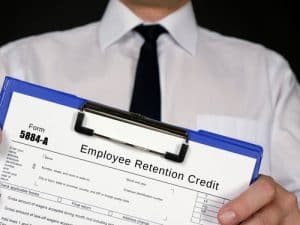You may be required to pay ERC fees if you hire someone to claim the credit on your behalf. Find out what you should expect to pay, as well as a way to avoid paying ERC fees.

On 1/10/24, IRS Commissioner Daniel Werfel announced that the IRS is continuing to improve and automate ERC review procedures and will begin processing new ERC claims in the spring following the moratorium implemented in September. Existing claims are still being processed and eligible businesses can still submit an ERC claim through reputable ERC companies to be processed when the moratorium ends. Visit our full breakdown of the ERC pause for the latest information.
Businesses are moving quickly to cash in on the Employee Retention Credit, a refundable tax credit that’s putting thousands of dollars back into small businesses. However, if you haven’t yet taken advantage of this tax credit, you may be wondering about potential ERC fees.
In this post, we’ll discuss the fees associated with using a financial professional or third-party ERC company to claim your ERC credit. We’ll also talk about how you can avoid these fees (spoiler alert: it means filing your own amended tax returns).
What Are ERC Fees & Charges? The Short Answer
Employee Retention Credit fees are fees that are paid to a CPA, tax expert, ERC specialist, or other expert that claims the ERC on a business’s behalf.
Business owners who opt to claim the credit themselves by filing an amended tax return with the IRS do not pay any fees. Filing the proper forms with the IRS is free. You will only pay fees if you hire a third party to calculate your ERC, prepare your amended return, and submit the proper documentation to the IRS.
Why Should You Pay ERC Fees?
If you have the option to claim your ERC at no charge, why would you opt to pay fees for a third party to prepare your amended return? Here’s why you should consider hiring a professional when it comes to claiming the ERC:
- Find Out If You Qualify: ERC guidelines can get confusing, especially considering that requirements for 2020 and 2021 are different. An ERC expert who’s well-versed in ERC guidelines can help determine if you qualify for ERC and for which quarters.
- Maximize Your Refund: Calculating the ERC can be a bit tricky. Business owners that are unfamiliar with ERC guidelines could miscalculate, which could result in a lower ERC, or worse, an inaccurate calculation that results in IRS penalties. ERC experts can help accurately calculate the ERC to maximize your refund while avoiding costly mistakes.
- Complete Tax Forms Correctly: Form 941-X is used to amend quarterly returns and is used to claim the ERC retroactively. While not impossible for someone new to taxes, the process can be frustrating and lengthy. An ERC pro can ensure that forms are filled out correctly so you can receive your ERC refund without any delays caused by mistakes in your paperwork.
- Protection During An Audit: Many professionals who specialize in ERC offer some sort of ERC audit protection. In most cases, you’ll receive a packet of paperwork that includes government shutdown orders, calculations, and other vital information you’ll need in the event that you’re audited by the IRS.
ERC Fee Structures
The structure and amount of ERC fees vary significantly. Here are some general guidelines to note based on whether you work with a CPA, a tax service provider, or an ERC company that specializes in ERC claims.
ERC Fees Charged By ERC Companies
Because small businesses can retroactively claim the ERC, there are a number of companies that now specialize in ERC claims. For a fee, these ERC companies prepare, calculate, and file ERC claims.
Most ERC companies charge a contingent fee. This means that the company will collect a percentage of the refund amount collected on behalf of the business. In most cases, this fee will not be paid until after the business receives its ERC refund check from the IRS.
Since ERC services are relatively new, there aren’t any studies or reports outlining average fees. However, based on Merchant Maverick’s research, the average ERC fee is around 15% to 25%.
Let’s look at an example to give you an idea of how much this would cost. If your business is set to receive $50,000 as an ERC refund and the company that claimed your credit charges 20%, you would pay $10,000 after receiving your refund. This would leave you with a total of $40,000 in funds.
Comparison Of ERC Company Fees
Here’s a quick overview of ERC company fees. Note that many ERC companies do not disclose this information and will only discuss fees after you’ve submitted basic information to see if you qualify (this service is generally free).
|
Fees |
Payment Options |
| ERC Specialists |
10%-15% |
- Customers that pay upfront are charged a 10% fee
- Customers who pay after receiving funds pay a 15% fee.
|
| ERC Today |
7.5%-15% |
- Fee percentage is based on the amount of your refund
- All customers pay fees only after receiving their refunds
|
| Innovation Refunds |
25% |
- Fees paid only after you receive your refund
|
| Lendio |
15% |
- Fees paid only after you receive your refund
|
ERC Fees Charged By CPAs
Professional standards prevent CPAs from charging contingent fees, so the pricing structure for preparing and filing for ERC will look a little different.
CPAs and tax professionals typically use one of two fee structures: hourly rates or fixed fees.
With an hourly rate, you’ll pay the third party an amount based on the time spent preparing and filing your ERC claim. For example, if the hourly rate is $100 and your CPA spent five hours on your claim, you’ll be billed for $500.
According to an NSA report, the average rate for tax services from a CPA is around $174/hour. However, this amount varies significantly from state to state, the experience level of the CPA, and other factors.
A fixed fee is a set fee that is charged for performing specific tasks. For example, a CPA may charge a fixed rate of $200 per Form 941-X that is prepared and filed with the IRS.
Costs can add up quickly, so it’s important to make sure that your ERC documentation is organized, especially if you’re paying an hourly rate. The more time a tax expert or CPA spends collecting and organizing information, the higher your invoice will be.
ERC Loan Fees
An ERC loan is a form of financing offered by some lenders as a solution to the IRS’s 12+ month backlog of claims. With these loans, business owners are able to receive their funds in as little as three business days.
What Are ERC Loan Fees?
While ERC loans are a convenient way to get some cash flow while waiting for your ERC refund, you do need to consider common ERC loan fees.
A lot of companies aren’t very transparent about these fees, but generally, you can expect to encounter maintenance fees, interest rates, and potentially application fees.
ERC loan fees are unrelated to anything you pay to file your ERC refund. You will only have to pay these fees if you take out an ERC loan.
Check out our complete guide to ERC loans for more information.
A Warning About Scams & ERC Fees
Unfortunately, not every ERC company is legit. There are a number of scammers that are taking advantage of innocent business owners, and the IRS has warned businesses to be on the lookout for these scams.
Often, these scammers request a fee paid upfront. Once paid, the claim never gets filed, important data can be stolen, a claim is filed for a business that isn’t eligible for the credit, or calculations are inflated. In the best-case scenario, the business owner simply loses the fee that was paid to the scammer. But it can get even worse, as the business could be required to repay ERC funds it wasn’t entitled to — along with possible penalties and interest.
While some legitimate ERC companies allow clients to pay upfront, this is also a major red flag for scams. Make sure to understand exactly what to look for when it comes to ERC scams, and do your research on all third-party companies to avoid these costly mistakes. Try working with one of our top-rated ERC companies, like ERC Specialists or Omega, for a trusted ERC provider.
How To Avoid Paying ERC Fees
As mentioned earlier in this post, there are no fees associated with filing your ERC claim unless you hire a third party. If you want to keep more of your money in your pocket, you can avoid paying ERC files by simply filing the proper forms yourself.
To file your ERC claim, you’ll need to:
While this option does take a bit more time and effort, many businesses find it worth it to save thousands of dollars in ERC fees.
FAQs About ERC Fees
Do ERC specialists charge fees?
If you hire an ERC specialist to claim your refund on your behalf, you will be required to pay a fee. Typically, this is a contingent fee that is a percentage of your ERC refund.
Does the IRS charge fees for ERC?
The IRS does not charge any fees for claiming your ERC refund. The only fees that will be paid are to a third party ERC company, CPA, or tax professional to prepare and file your amended returns. There are no fees if you file for the credit yourself.
How much are fees for ERC?
Fees for claiming your ERC vary. Tax pros and CPAs typically charge an hourly or flat rate. ERC companies char a contingent fee that generally ranges from 15% to 25% of your refund amount.
The Bottom Line On ERC Fees
If you hire someone to calculate, prepare, and file your ERC, be prepared to pay the fees and other charges that come along with this service. If you don’t feel up to the task of claiming the ERC yourself, start your search for an ERC professional with our list of the best ERC companies. These companies offer features like competitive fees, free ERC analysis, and audit protection.












